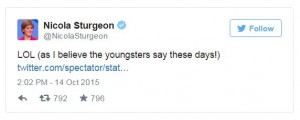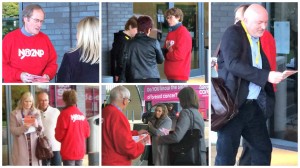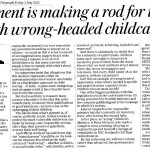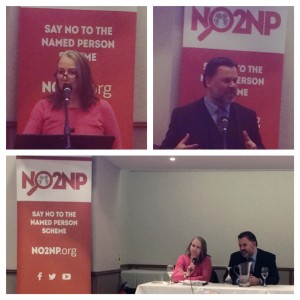Blog
Keeping you up to date on the progress of the Named Person scheme and the NO2NP campaign.
Sturgeon claims ‘Named Persons not a breach of human rights’
Posted 9 years agoFirst Minister Nicola Sturgeon has claimed during a BBC interview that the Supreme Court did not say the Named Person policy was illegal or breached human rights.
She maintained the Government spin that the bulk of the scheme is unaffected by their defeat in the Supreme Court, downplaying the court defeat as “a particular concern upheld in the Supreme Court around the data-sharing aspects of this”.
If only she had read the judgment for herself:
“the sharing of personal data between relevant public authorities is central to the role of the named person” (para. 78).
“one of the principal purposes [of the Named Person law]… was to alter the existing law in relation to the sharing of information about children and young people, so as to enable information about concerns about their wellbeing” (para. 4).
“the information-sharing provisions … are incompatible with the rights of children, young persons and parents under article 8 of the ECHR because they are not ‘in accordance with the law’ … may in practice result in a disproportionate interference with the article 8 rights of many children, young persons and their parents, through the sharing of private information … the information-sharing provisions of Part 4 of the Act are not within the legislative competence of the Scottish Parliament” (para. 106).
“…since the defective provisions are not within the legislative competence of the Parliament, they cannot be brought into force” (para. 109).
Still claiming it’s about child protection
The First Minister said her Government was “determined” to “progress with this policy … because it is about trying to protect children”. But even arch loyalists like Alistair Gaw have admitted the Named Person is “not about child protection”.
The First Minister also claimed she wanted to act “in a way that brings people together and addresses people’s concerns as we go”. Her Deputy First Minister’s refusal to consult with anyone who doesn’t agree with his policy doesn’t augur well for this.
The First Minister was responding to a question during a BBC webchat yesterday. Click here to watch the exchange.
As BBC Scotland’s political editor says to the First Minister, “Folk are still not very happy with this.”
The media and the Government know we are not going away. Let’s keep up the pressure.
FIRST MINISTER REITERATES CLAIM ‘NAMED PERSON SCHEME NOT OBLIGATORY’
Posted 10 years agoFirst Minister Nicola Sturgeon reiterated her claim that the Named Person scheme is an ‘entitlement’ and ‘not an obligation’ when questioned in Holyrood today.
WATCH: First Minister reiterates ‘no obligation’ claims during FMQs
Speaking during First Minister’s Questions, she said: “Well as I have said and I’ll say again today, the Named Person scheme is an entitlement. I think it is a good and sensible entitlement. It is not an obligation. It helps children and families get the support they need from services, when they need it.”
She stated: “It does not in any way, shape or form replace or change the role of the parent or carer or undermine families.”
But just earlier this week her own Government published a response to a UN committee stating that “every child in Scotland will have a Named Person who will receive training in identifying, assessing and responding to their needs”.
And the Named Person legislation not only neglects to mention parental opt-out, but also completely misses the entire concept of parental consent.
Her own Government’s QC, Alistair Clarke, said during the Named Person legal challenge at the Court of Session that to allow an opt-out would “defeat the purpose of the scheme”.
The First Minister, responding to questions from Ruth Davidson MSP, leader of the Conservatives, told the chamber today: “The fact of the matter is that the children and parents are not legally obliged to use the Named Person service, or take up any of the advice or help that is offered to them”.
She added that, “parents are not legally obliged to use it because it is an entitlement not an obligation. I think that’s sensible, making sure it is there for everybody when they do need it, if they do need it, but not obliging anybody to use it if they feel they don’t need it.”
The First Minister was accused of sending “mixed messages” during an interview with BBC Scotland’s Political Editor Brian Taylor last week, when she said that the Named Person scheme was “not mandatory”.
There is no Named Person opt-out despite First Minister’s assurances
Posted 10 years agoFirst Minister Nicola Sturgeon has been accused of sending “mixed messages” in her claim that the Named Person scheme is “not mandatory”.
WATCH: Nicola Sturgeon contradicts her own QC and denies Named Person scheme is mandatory
During an interview with BBC Scotland’s Political Editor Brian Taylor, the First Minister commented on the Named Person scheme, saying: “It’s not compulsory, it’s an entitlement, not an obligation. If the parent doesn’t want to have anything to do with the Named Person scheme they don’t have to… It’s not mandatory.”
There has been a backlash in the press and from the public urging the First Minister to clarify her statement, which contradicts the Government’s own QC, who told the Court of Session that to allow an opt-out would “defeat the purpose of the scheme”.
A NO2NP spokesman told the press: “If the First Minister thinks the Named Person scheme is ‘not mandatory’ then she has been very badly misled by her advisers.”
“When she realises how inaccurate the advice from officials has been I imagine heads will roll. They’ve made her look very silly because she may be the only person in Scotland who doesn’t know that the Named Person scheme contains no opt-outs and no provision for parental consent. It is, on any ordinary understanding of the word, mandatory.
“Given how unpopular the scheme is, it is highly convenient for the First Minister to say it’s not compulsory. Sadly it just doesn’t happen to be true.”
The phrase ‘opt out’ appears absolutely nowhere in the legislation. The concept of parental consent is also entirely absent.
A Named Person will be appointed for every child in Scotland. They will have legal power to obtain your confidential family data without your consent or knowledge. They will have a legal duty to monitor your child’s happiness whether you want them to or not, and power to bring in other agencies to deal with your child without your consent. If that’s not mandatory, what is?
The frightening reality is that refusal to engage with a Named Person could well be treated by the authorities as a red flag leading officials to escalate concerns about a family. This increases the likelihood that child protection powers will be invoked to allow coercive intervention in the life of the family. So telling a Named Person you want to be left alone to take care of your own family could be the very thing they use against you to justify intervention.
If the scheme was voluntary, it would be fine. Parents who want help would know where to go to get it. But the Named Person law is universal – appointing a Named Person, with all their powers, over every child, with no opt-out, no right to confidentiality, and no requirement for parental consent.
Dr Stuart Waiton, a sociologist at Abertay University, called on the First Minister to clarify her statement.
He commented: “Named persons are being trained in a particular way to measure children’s progress and development and it is going to be very difficult for parents to reject their ‘advice’ – many will fear that rejection could count against them.
“By bringing in a kind of parental support agency, and suggesting that there is a ‘rulebook’ for parenting that must be adhered to, the Scottish Government risks undermining the authority of parents.”
NAMED PERSON SCHEME IS NO LAUGHING MATTER
Posted 10 years agoThe Guardian newspaper reports that First Minister Nicola Sturgeon is laughing off ‘big sister’ criticisms of the Named Person scheme.
Sturgeon tweeted “LOL” in response to a cartoon and article in the Spectator magazine depicting her as ‘big sister’ and referring prominently to the Named Person scheme.
A spokesman for NO2NP said the Named Person scheme was a “massive infringement of civil liberties, human rights, and involves a huge amount of data sharing”.
He stated: “There are several glaring problems with the Named Person scheme which the Scottish Government has so far failed to address or even admit.
“It is a mandated intrusion into family life and the grounds for intervention are set at the alarmingly low level of ‘wellbeing’ rather than welfare.”
He added: “There is also the disturbing prospect that appointing a state guardian for every child will massively overburden the social care system, leading to vulnerable children being missed.
“Identifying at risk children is already like looking for a needle in a haystack – the answer to the problem cannot be to make the haystack bigger.”
The Guardian also reported on our NO2NP volunteers handing out campaign leaflets to delegates going into the SNP Conference in Aberdeen, where the First Minister is due to speak for a second time tomorrow afternoon.
Source:
Nicola Sturgeon laughs off ‘big sister’ criticism of named person scheme
The Guardian, 15 October 2015
Scots Govt “making a rod for its own back”, says newspaper editor
Posted 11 years agoIn a comment piece, the editor for the Scottish Daily Telegraph, Alan Cochrane, added his voice to criticism of the Named Person scheme.
Referring to the plans, Cochrane said that the Scottish Government is “making a rod for its own back”.
“That it deserves a caning there is absolutely no doubt whatsoever”, he added.
He continued: “This is, arguably, one of the most unpopular measures I can ever remember any government seeking to impose on its citizens – so much so that it is not too much of an exaggeration to suggest that it risks generating a massive level of civil disobedience in that many parents will simply refuse to comply with what’s about to be implemented.”
Cochrane went on to criticise supporters of the Named Person scheme who write off parental concerns as “pure scare-mongering”.
He said “that is unlikely to reassure many parents who object to the idea that some outside party, no matter their qualifications or good intentions, can have a say on the upbringing of their children”.
He described the wide reaching plans as an example of “wrong-headed universality when what’s needed is specific and targeted action to protect those children who are most at risk”.
Cochrane said that he suspects First Minister Nicola Sturgeon will soon have to “take a direct interest” in the plans.
He concluded: “If she’s wise, she’ll cut her losses consign it straight to the waste bin.”
Dr Stuart Waiton TESS article: “Up close and personal”
Posted 11 years agoDr Stuart Waiton, a prominent opponent of the Named Person scheme, has voiced his concerns in an article in TES Scotland published on 22 May. With Dr Waiton’s permission, we have reproduced the article in full below.
“A RECENT blog could be a sign of things to come as the Scottish government’s ‘named person’ legislation kicks in.
The posting, written by an irate mother of a 13-year-old in Aberdeen, complains about a nurse- not the usual school nurse- having a ‘little chat’ her daughter.
The questions the girl was asked included, ‘Have you started your menstrual period?’, ‘Do you feel loved and cared for?’ and ‘Do you feel safe and secure in your home?’
The questions continued, probing about the pupil’s relationship with her mother. The child began to feel uncomfortable. When the mother found out, she was ‘absolutely RAGING’.
The interview was part of the named person project, a system whereby every child in Scotland will be given a named guardian to oversee their safety and wellbeing – an initiative that could transform the relationships between schools and parents.
A key problem with the named person set-up is that teachers will now be responsible – and trained to be responsible – for the ‘wellbeing’ of every child.
This may sound fair enough, but the breadth of meaning the term well-being can encompass suggests that the roles of parent and teacher will be confused. So, for example, everything from how respected a child is by their carers to how much responsibility they are given by them could become a matter of concern and intervention.
Given the emphasis placed on being aware of ‘risks’ and the potential anxiety about not flagging up a problem early enough, the likely trend is for more and more children to be investigated and put on a children’s plan.
When defending the named person legislation, first minister Nicola Sturgeon and others argue that this is about protecting the most vulnerable children, but this is disingenuous. This is a universal service that is trying to prevent problems occurring in the future, and doing so by massively increasing the basis upon which teachers’ concerns and suspicions trigger action. Consequently, all sorts of emotional or personal issues that would previously have been seen as aspects of growing up, or as issues for the family, will become a legally enforced matter for the named person – for teachers.
Teaching unions have said little about this subject so far – a surprising state of affairs given the seriousness of this development and the pressures that will be placed on senior staff in particular to take on this new role.
Worryingly, as parents find out about the named person system, it is likely that some will begin to treat teachers with suspicion and fear, nervous about sharing personal information with them or discussing difficulties their children are having at home.”
Dr Stuart Waiton is a senior lecturer in sociology and criminology at Abertay University.
NO2NP Roadshow: Elgin highlights
Posted 11 years agoThe campaign saw strong support in Elgin last night as concerned parents and individuals, with some traveling quite a distance, turned out for the latest NO2NP Roadshow.
Nigel Kenny of The Christian Institute explained that the campaign was made up of a broad coalition of organisations and individuals from academia, charities, education, medicine, politics and social work. He said all those involved have a shared concern for the importance and autonomy of the family in raising the next generation.
Videos were shown, the first explaining the background to the campaign, and the second from First Minister’s Questions last week, when NO2NP supporter Liz Smith MSP challenged Nicola Sturgeon over Clan (Community Law Advice Network) Childlaw’s concerns about data sharing.
Lesley Scott from Tymes Trust then spoke about the blueprint for every child’s life that has been planned under the GIRFEC (Getting It Right For Every Child) model, including the Wellbeing Wheel, the My World Triangle and the Resilience Matrix. She pointed out that Edinburgh University had identified no fewer than 304 outcomes that could arise from the SHANARRI “wellbeing” indicators.
Nigel finished off the talks with an update on the judicial review appeal (due to be heard in Edinburgh on 3rd and 4th June) and some tips on how people can get involved with the campaign.
There was a lively and extended Q&A at the end, where people expressed their deep concerns about the negative impact that the scheme will have on families, schools and society at large.
The NO2NP Roadshow will be stopping off at Falkirk next on Wednesday 27th May, when we’ll be at the Best Western Park Hotel in Camelon Road at 7.30pm. Hope to see you there if you live in and around the area!
VIDEO: NICOLA STURGEON ON THE DEFENSIVE OVER DATA SHARING
Posted 11 years agoIn Holyrood yesterday, Nicola Sturgeon was pressed by Liz Smith MSP over the compatibility of the Named Person scheme with a child’s right to privacy.
Smith was highlighting concerns raised by Community Law Advice Network (Clan Childlaw), who recently explained that the plans could result in children having no expectation of privacy, which could lead to them shunning helplines and advisory services.
Currently information can be shared without a child’s consent if there is a “risk of significant harm” to a child.
But under the Named Person scheme information can be shared if there is simply concern for a child’s “wellbeing” – a phrase so broad that it now embraces terms such as happiness, quality of life, economic status, health, educational achievement and levels of respect for the child and others.
When asked to respond to concerns raised by Clan Childlaw, Sturgeon said: “Information sharing should always be appropriate, and it should always be proportionate to concerns about wellbeing”.
VIDEO: Nicola Sturgeon pressed at First Minister’s Questions to u-turn on Named Person
Posted 11 years agoIn Holyrood yesterday, Nicola Sturgeon was pressed by Ruth Davidson MSP to do a u-turn on implementing the controversial Named Person scheme.
Davidson, the leader of the Scottish Conservative Party, said: “This First Minister has already delivered a u-turn on her predecessor’s plans on corporation tax, she has U-turned on a new women’s super prison, she’s now done the right thing and U-turned on corroboration.
“Families are asking her on named person: will she do the right thing and U-turn on this too?”
But Sturgeon responded: “On named person, Ruth Davidson cannot go on describing things that are democratically passed by a majority of this parliament, just because she doesn’t agree with them, as somehow against the democratic wishes of the country.”









